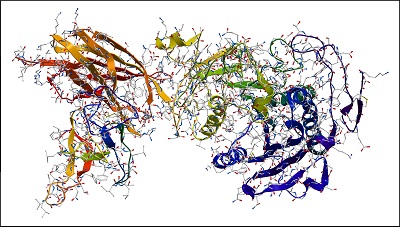Our mission is to support scientific questions on pharmaceutical enzymes and their standardisation
 In 1960, during the General Assembly of FIP in Copenhagen, Denmark, a scientific symposium on enzymes used in pharmacy was organised. The available assays to measure enzymatic activity as described in different pharmacopoeias were often obsolete or inadequate. To cope with this unsatisfactory situation, the FIP Council appealed to Prof. R. Ruyssen (FIP vice-president 1955-60 and director of the Laboratory of General Biochemistry and Physical Pharmacy, University of Ghent, Belgium) to form an international commission to study these problems and to formulate proposals for better assay and control methods for pharmaceutical enzymes. Prof. Ruyssen founded the FIP International Commission on Pharmaceutical Enzymes.
In 1960, during the General Assembly of FIP in Copenhagen, Denmark, a scientific symposium on enzymes used in pharmacy was organised. The available assays to measure enzymatic activity as described in different pharmacopoeias were often obsolete or inadequate. To cope with this unsatisfactory situation, the FIP Council appealed to Prof. R. Ruyssen (FIP vice-president 1955-60 and director of the Laboratory of General Biochemistry and Physical Pharmacy, University of Ghent, Belgium) to form an international commission to study these problems and to formulate proposals for better assay and control methods for pharmaceutical enzymes. Prof. Ruyssen founded the FIP International Commission on Pharmaceutical Enzymes.
This Focus Group on Pharmaceutical Enzymes is part of FIP’s Special Interest Group on Analytical Sciences and Pharmaceutical Quality. It is involved in the support of scientific questions regarding pharmaceutical enzymes and their standardisation. It cooperates closely with the International Commission on Pharmaceutical Enzymes. In the future it will develop closer contacts worldwide between pharmaceutical scientists and pharmacists within its focus.
What we do: Advice, collaboration and standards
Advice on the assay and quality control of pharmaceutical enzymes
Pharmaceutical enzymes are challenging for the pharmaceutical scientist, especially the assay and pharmaceutical quality control. The major task of this focus group is to offer privileged support to any FIP member searching for guidance with enzyme-related analytical problems. In contrast to most current pharmaceutically active molecules, enzymes are not assayed by measuring the number of molecules but by evaluating their biologic action: only those enzyme molecules that have the correct tertiary structure can help treat diseases and it is our goal to evaluate pharmaceutical enzymes by their action (e.g. the digestive action of lipase by measuring the rate of hydrolysis of a lipid).
Collaboration with the FIP International Commission on Pharmaceutical Enzymes
Enzyme activity is determined by the quantity of substrate transformed or product formed per unit time. The measured reaction rates depend on kinetic mechanisms, the affinity of the enzymes for their substrates and on a number of experimental conditions such as temperature, pH, ionic strength, and the presence or absence of inhibitors or activators. It is only under the conditions specified in the prescribed assay procedures that enzyme units are defined.
Assay accuracy and reproducibility are the most stringent requirements for the determination of enzyme potencies in pharmaceutical formulations. Furthermore, the unit value must correspond to an enzyme activity the physician can relate to. Expression of activity in units based on molar concentration changes per time unit is only possible when the substrate molar concentration, the reaction mechanism, and the resulting rate equation are known. For pharmaceutical enzymes this is impossible in most cases. The biological substrates (proteins, polysaccharides, bacteria, oil emulsions) often have a molecular complexity and the fact that the potential number of bonds susceptible to attack by the enzyme is not always known, makes the development of suited methods and good standardisation practices necessary.
The FIP International Commission on Pharmaceutical Enzymes (gathering experts from pharmaceutical companies, universities, institutes and control laboratories) also improves assay methods and has guidelines for the preparation of pharmaceutical enzyme reference materials, calculates the potency in terms of FIP Biological Reference Preparations (BRP’s), expressed in international “FIP units”.
The commission’s Centre of Standards, located at Ghent University’s Laboratory of General Biochemistry and Physical Pharmacy in Belgium, coordinates collaborative enzyme assays between academic, industrial and national pharmaceutical control laboratories and distributes FIP enzyme standards.
Enzymes are known to have a limited stability. A major challenge is the optimisation and regular control of the stability of the reference standards. The European Directorate for the Quality of Medicines (EDQM) has a mutual agreement with the Centre of Standards for the provision of Biological Reference Preparation (BRP) pharmaceutical enzymes, substrates and activators. It has adopted the FIP methods for most of its pharmaceutical enzyme monographies in its handbook, the European Pharmacopeia. The pharmaceutical enzymes covered are hydrolases (pancreatic lipase, amylase, protease, hyaluronidase etc) acting on complex substrates.
Besides those enzymes, the Centre for Standards also provides BRPs and assay methods for other pharmaceutical enzymes such as microbial lipases (lysozyme, papain etc) as specified in the Food and Chemicals Codex.
Who we are
FIP’s pharmaceutical enzymes focus group is coordinated by Prof. Jo Demeester. From 1994 to 2016, Prof. Demeester was the director of the Centre for Standards of the FIP International Commission on Pharmaceutical Enzymes and, from 1997 to 2016, he was director of the Laboratory of General Biochemistry and Physical Pharmacy at Ghent University. He is the current president of the commission and also the enzyme expert in the Group on Biological Products of the European Pharmacopeia.

Contact
For more information or for response to scientific questions regarding pharmaceutical enzymes and macromolecular pharmaceuticals of biologic origin, please contact Prof. Demeester (Jo.Demeester@ugent.be).